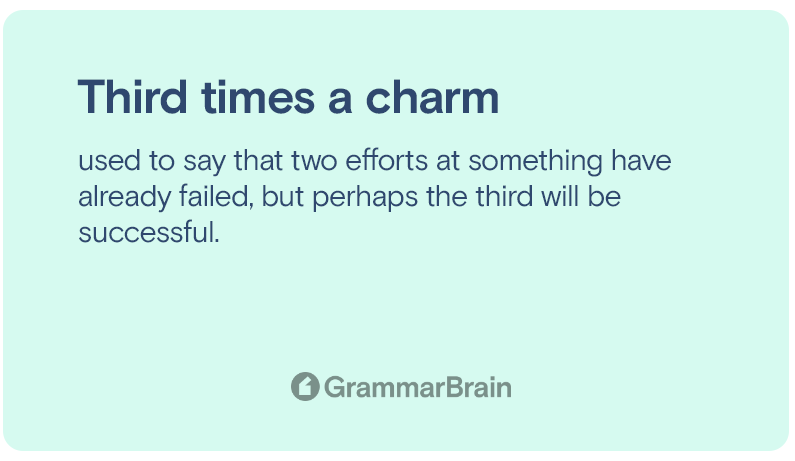We have all heard this saying and wondered what it could mean. Is third time a charm? Third time at what and what does charm mean?
No worries! In this article, let us break down this phrase, understand its meaning and learn how you can use it correctly the next time.

Meaning of “third times a charm”
The third time is a charm essentially means that the third try at something is lucky and will possibly bring you success.
Here, the third time refers to a third try or a third attempt at a task.
And charm refers to good luck.
If someone has failed two attempts at some task, it is believed the third time will be a charm.
That is the third time that will prove to be lucky.
This is a hopeful statement that is most likely used to encourage someone to keep trying even after two failed attempts.
Definition of “third times a charm”
Merriam-Webster defines this saying as:
The third time is a charm: used to say that two efforts at something have already failed, but perhaps the third will be successful.
Origin of “third times a charm”
As popular as this idiom is, it is also a strange one. There is no possible explanation as to why number three or a third try is considered lucky. However, there are some theories that explain how this saying originated.
It is believed that this idiom dates back to the 1800s. At this time, anything found in sets or pairs of three was considered holy. The number three was a sign of good luck. Hence, the saying that the third time is a charm.
Another theory suggests that this saying is a hint at perseverance. It is a way to encourage a person to keep going at the task without giving up within a few tries. With each try, a person gets better at the task at hand, and hence the more you try, the more the chances you getting it right.
Ways to use the idiom
There are two ways to use this phrase-
1. as a hopeful statement, used before a third try.
Let’s say a friend tries his hand at a game but fails to win the first and second times. Now you wish to motivate him to give it a third try because you’re sure he might do well this time, so you say:
“Keep going, mate, third time’s a charm!”
2. as an indicative statement, used after a third attempt brings success.
Let’s say your friend keeps trying to win the game and doesn’t get it right the first or second time. He tries again and wins on the third try. Now you say:
“I knew you would win it on this try, third time’s a charm.”
Examples
This saying is fairly informal. Hence it’s use should be avoided in formal and legal communication.
Here are a few examples that will help you understand how this saying can be used in conversations.
Example 01:
Aaron: I finally cleared the test I was stuck on for so long.
Brian: As they say, the third time is a charm!
Example 02:
Celia: You’ve suffered huge losses after making these investments twice. Do you still want to try again?
Dorothy: Yes, I will give it another shot. The third time’s a charm, anyway.
I hope this article helped you understand the meaning and use of the saying. Use it in your conversations the next time and charm your friends!
Inside this article
Fact checked:
Content is rigorously reviewed by a team of qualified and experienced fact checkers. Fact checkers review articles for factual accuracy, relevance, and timeliness. Learn more.
Core lessons
Glossary
- Abstract Noun
- Accusative Case
- Anecdote
- Antonym
- Active Sentence
- Adverb
- Adjective
- Allegory
- Alliteration
- Adjective Clause
- Adjective Phrase
- Ampersand
- Anastrophe
- Adverbial Clause
- Appositive Phrase
- Clause
- Compound Adjective
- Complex Sentence
- Compound Words
- Compound Predicate
- Common Noun
- Comparative Adjective
- Comparative and Superlative
- Compound Noun
- Compound Subject
- Compound Sentence
- Copular Verb
- Collective Noun
- Colloquialism
- Conciseness
- Consonance
- Conditional
- Concrete Noun
- Conjunction
- Conjugation
- Conditional Sentence
- Comma Splice
- Correlative Conjunction
- Coordinating Conjunction
- Coordinate Adjective
- Cumulative Adjective
- Dative Case
- Determiner
- Declarative Sentence
- Declarative Statement
- Direct Object Pronoun
- Direct Object
- Diction
- Diphthong
- Dangling Modifier
- Demonstrative Pronoun
- Demonstrative Adjective
- Direct Characterization
- Definite Article
- Doublespeak
- False Dilemma Fallacy
- Future Perfect Progressive
- Future Simple
- Future Perfect Continuous
- Future Perfect
- First Conditional
- Irregular Adjective
- Irregular Verb
- Imperative Sentence
- Indefinite Article
- Intransitive Verb
- Introductory Phrase
- Indefinite Pronoun
- Indirect Characterization
- Interrogative Sentence
- Intensive Pronoun
- Inanimate Object
- Indefinite Tense
- Infinitive Phrase
- Interjection
- Intensifier
- Infinitive
- Indicative Mood
- Participle
- Parallelism
- Prepositional Phrase
- Past Simple Tense
- Past Continuous Tense
- Past Perfect Tense
- Past Progressive Tense
- Present Simple Tense
- Present Perfect Tense
- Personal Pronoun
- Personification
- Persuasive Writing
- Parallel Structure
- Phrasal Verb
- Predicate Adjective
- Predicate Nominative
- Phonetic Language
- Plural Noun
- Punctuation
- Punctuation Marks
- Preposition
- Preposition of Place
- Parts of Speech
- Possessive Adjective
- Possessive Determiner
- Possessive Case
- Possessive Noun
- Proper Adjective
- Proper Noun
- Present Participle
- Prefix
- Predicate



